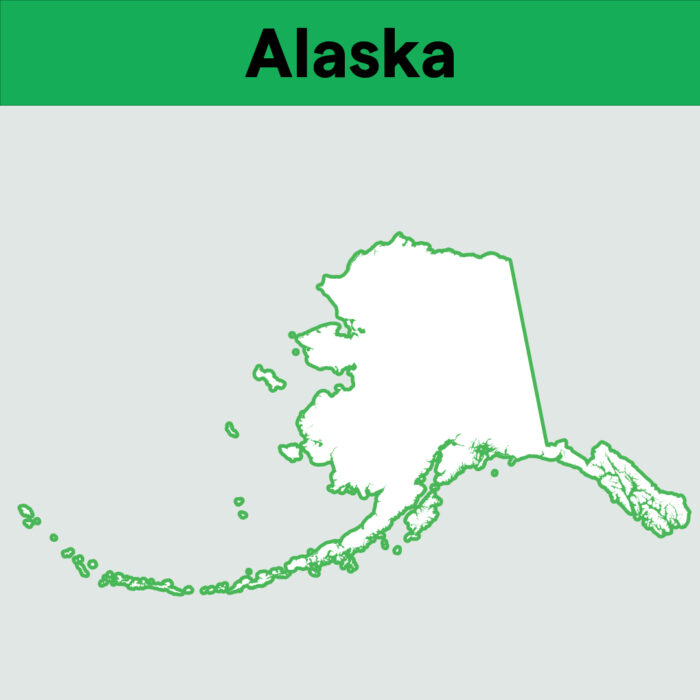What creates sales tax nexus in every state
by October 23, 2023
Please note: This blog was originally published in 2019. It’s since been updated for accuracy and comprehensiveness.
Forty-six states and Washington D.C. all have a sales tax. But every state is different – the exact laws that create sales tax nexus in one state may be a little different in another. This post lists all the states and a link to sales tax laws with the exact wording they use regarding what business activities create sales tax nexus.
Remember, if you have sales tax nexus in a state, you need to:
- Register for a sales tax permit in that state
- Charge sales tax to customers in that state regardless of how you sold them a product or from where that product shipped
- File sales tax returns in that state
Also note that it’s almost impossible to avoid home state nexus (meaning if you live or work in a state then you’ll probably have nexus there), so this list focuses on what constitutes nexus for out-of-state sellers. Keep in mind that in many cases what we think of as “sales tax” when we pay it as referred to as “use tax” when collected and remitted by an out-of-state seller.
If you’re wondering if you have sales tax nexus in a state, find it below to read what that state’s laws and/or main taxing authority has to say about sales tax nexus.
What conditions create sales tax nexus in every state
Note: Most definitions of nexus include the terms “doing business” or “engaged in business.”
Alabama – Alabama code section 40-23-68 details what creates sales tax nexus in Alabama. Starting after the South Dakota v. Wayfair Supreme Court ruling on June 21, 2018, Alabama also says that some sellers have economic nexus. Read Alabama’s economic nexus law here.
Arizona – Arizona’s Nexus in Arizona guide details what creates sales tax nexus in Arizona. Further, Arizona provides guidance for retailers who have economic nexus in the state here.
Arkansas – The Arkansas Department of Finance and Administration’s “Arkansas Rules” publication from 2008 details nexus on page 1, under “F. Doing Business As.” Arkansas enacted economic nexus in July 2019 and have provided guidance for remote marketplace sellers here.
California – Section 6203 of the California Revenue and Tax Code talks about what creates sales tax nexus in California.
Colorado – Regulation 39-22-301.1 from the Colorado Department of Revenue goes into what creates sales tax nexus in the state. Colorado also has an economic nexus law, and provides guidance for out of state sellers here.
Connecticut – The Connecticut Department of Revenue states provides a general overview of this information on their “What is nexus?” page under the “Sales and Use Tax” section. You can see their exact statues in Section 12-407 of the Connecticut General Statutes. Connecticut also has economic nexus and provides guidance for remote sellers here.
Florida – Florida calls sellers with nexus “dealers,” and defines “dealer” in the Florida code section 212.0596. Florida also has economic nexus and provides guidance for out of state sellers here.
Georgia – Georgia calls sellers with nexus “dealers,” and defines dealer in Georgia code title 48, section 48-8-2(3). Starting January 1, 2018 Georgia also has an economic nexus law. You can read Georgia’s economic nexus law here. Read more about economic nexus here.
Hawaii – Hawaii doesn’t have sales tax, but does have a “general excise tax.” Most states with any kind of presence in Hawaii, including providing services, will likely be subject to the general excise tax. Hawaii defines doing business in their General Excise Tax law, chapter 237-2 (Starts on p. 4 of this link). Starting July 1, 2018 Hawaii also has an economic nexus law. You can read Hawaii’s economic nexus law here. Read more about economic nexus here.
Idaho – Idaho considers “retailers engaged in business” in Idaho to have sales tax nexus. Here’s how Idaho defines sales tax nexus (click “Sales and Use Tax Homepage”). Idaho also has an economic nexus laws, which you can read here.
Illinois – Illinois considers “retailers” in the state to have sales tax nexus. Here’s how Illinois defines retail sales in the Illinois Retailer’s Occupation Tax Act. Starting October 1, 2018 Illinois also has an economic nexus laws. You can read Illinois’ economic nexus laws here and here. Read more about economic nexus here.
Indiana – Indiana considers “retailers” to have nexus in Indiana. Here’s how Indiana defines retailers with nexus: Indiana Code 6-2.5-3-1(c) (you may have to choose “Chapter 6: Taxation” then use the search bar within the code). Indiana also has an economic nexus law, and you can read Indiana’s economic nexus law here.
Iowa – Iowa defines retailers with sales tax nexus in Code of Iowa Section 423-1(43). Starting January 1, 2019 Iowa also has an economic nexus law. You can read Iowa’s economic nexus law here.
Kansas – Kansas statute 79-3702(h)(1) defines what business activities are considered to create sales tax nexus in Kansas. Kansas also has an economic nexus law and you can read guidance for retailers here.
Kentucky – Retail activities that create nexus in Kentucky are described in Kentucky statute 139.340(2). Starting July 1, 2018 Kentucky also has an economic nexus law. You can read Kentucky’s economic nexus guidance here.
Try TaxJar for fee
TaxJar offers one platform to manage every aspect of sales tax compliance from calculations to reporting to filing. Try our sales tax compliance platform for 30 days, completely free with no obligation.
Get startedLouisiana – Louisiana considers entities “Engaging in business in a taxing jurisdiction” to have nexus. This definition can be found in Louisiana Code Sec. 47:301(4). Starting June 21, 2018 Louisiana also has an economic nexus law. You can read Louisiana’s economic nexus law here.
Maine – You can find what constitutes sales tax nexus in Maine in their “Sales Tax Reference Guide.” (This guide is updated annually, so be sure to look for the most recent date.) Effective October 1, 2017 Maine also has an economic nexus law. You can read Maine’s economic nexus guidance for retailers here.
Maryland – Maryland calls retailers “vendors” and defines their sale tax requirements in their state code here. They define what make an “out of state vendor” here. And you can read Maryland’s economic nexus law here.
Massachusetts – You can find out what constitutes nexus on this page under the heading “Who is a sales/use tax vendor?” Starting October 1, 2017 Massachusetts also has an economic nexus law. You can read Massachusetts’ economic nexus law here. Read more about economic nexus here.
Michigan – Find out what Michigan has to say about sales tax nexus here. Also note that Michigan updated their definition of nexus as of October 1, 2015. You can read Michigan’s economic nexus law here.
Minnesota – Minnesota defines sales tax nexus in Minnesota Statute 297A.66. You can read the Minnesota economic nexus law here.
Mississippi – Find out what constitutes doing business/sales tax nexus in Mississippi here (Click “What is nexus?”). Starting December 1, 2017, Mississippi also has an economic nexus law, and you can read Mississippi’s economic nexus laws here.
Missouri – Find out what constitutes sales tax nexus in Missouri in the Missouri Revised Statutes here. (If the link doesn’t work, search Section 144.635). Missouri does not currently have an economic nexus sales tax law.
Nebraska – Nebraska Revised Statute 77-2701.13 defines what business activities create sales tax nexus in Nebraska. You can read about Nebraska’s economic nexus law here.
Nevada – Nevada code Chapter 372 details what creates sales and use tax nexus. You can also read guidance for remote sellers on Nevada sales tax here.
New Jersey New Jersey code Section 54 describes who is required to collect sales tax in the state. You can read guidance on the text of New Jersey economic nexus law here.
New Mexico – New Mexico has a “gross receipts tax” rather than a sales tax. You can most easily find out more about who has to collect and remit gross receipts tax here. You can also read the full text of New Mexico’s economic nexus law here.
New York – New York defines “vendors” as having sales tax nexus. You can find the definition of “vendor” in New York Code Section 1101(B)(8). You can also read guidance on New York’s economic nexus sales tax law here.
North Carolina – You can find North Carolina’s definition of “engaged in business” (which creates sales tax nexus) here (p. 5 under “Engaged in Business.”) You can read about North Carolina’s economic nexus law here.
North Dakota – In North Dakota, any “Retailer maintaining a place of business in this state” has nexus. You can find that definition here (p. 2). Starting October 1, 2018 North Dakota also has an economic nexus law. You can read about North Dakota’s economic nexus law here.
Ohio – Ohio discusses what constitutes nexus for out-of-state sellers here. (Search for the term “Vendor.”) You can read about Ohio’s economic nexus law here.
Oklahoma – You can click here to read exactly what the Oklahoma Department of Revenue (Oklahoma’s taxing authority) has to say about what constitutes sales tax nexus in Oklahoma (page 8 – “Place of Business.”) Oklahoma also has an economic nexus law and you can read Oklahoma’s full economic nexus law here.
Pennsylvania – Pennsylvania considers sellers “having or maintaining a place of business” in the state to have nexus. Here’s what Pennsylvania code has to say about what defines “having or maintaining a place of business.” Pennsylvania also has an economic nexus law and you can read more about Pennsylvania’s economic nexus law (and notice and reporting requirements) here.
Rhode Island – See p.3 of this document for what constitutes “engaging in business in the state” of Rhode Island. (Search for the term “Engaged in business.”) You can read Rhode Island’s economic nexus law (and notice and reporting requirements) here.
South Carolina – South Carolina spells out who has sales tax nexus in the state on this page under “Who is required to file a sales and use tax return? Also, you can read guidance on South Carolina’s economic nexus law here.
South Dakota – Any “retailer maintaining a place of business in the state” has sales tax nexus in South Dakota. See their definition on p. 5 here. South Dakota also pioneered economic nexus laws, and you can read more about South Dakota’s economic nexus law here.
Tennessee – You can find Tennessee’s definition of sales tax nexus for out-of-state retailers here. Starting July 1, 2017 (and pending litigation) Tennessee also has an economic nexus law. You can read Tennessee’s economic nexus law here. And read more about economic nexus here.
Texas – You can find Texas’s definition of “engaged in business” in the Texas code Sec. 151.107. You can read about Texas’s economic nexus law here.
Utah – Read Publication 37 for what constitutes sales tax nexus in Utah. And, you can read about Utah’s economic nexus law here.
Vermont – Find out what creates sales tax nexus for out of state sellers in Vermont here (under subheading (9).) Vermont also has an economic nexus law, and you can read guidance on economic nexus from the Vermont Department of Revenue here.
Virginia – Virginia considers “dealers” to have sales tax nexus. Find out how Virginia defines “dealer” here. (This definition is updating on July 1, 2017. You can read more about Virginia’s new definition of “dealer” here.) Read Virginia’s complete legislation on economic nexus here.
Washington – This publication defines nexus in Washington state. You can also read more about Washington’s economic nexus law (and notice and reporting requirements) here.
Washington D.C. – Sellers “engaging in business in the District” have sales tax nexus in the District of Columbia. Find out what they mean by “engaging in business in the District” by searching for those terms here. You can read guidance on the text of Washington D.C. economic nexus law here.
West Virginia – You can read about what creates sales tax nexus for online sellers selling into West Virginia here. You can read what West Virginia has to say about economic nexus here.
Wisconsin – View “activities which create Wisconsin nexus” here. Wisconsin also has economic nexus, and you can read about the Wisconsin economic nexus ruling here.
Wyoming – Wyoming considers “vendors” to have sales tax nexus. You can find Wyoming’s definition of “vendor” here under “Article 1 – State Use Tax.” Wyoming also has an economic nexus law. You can read Wyoming’s economic nexus law here.







